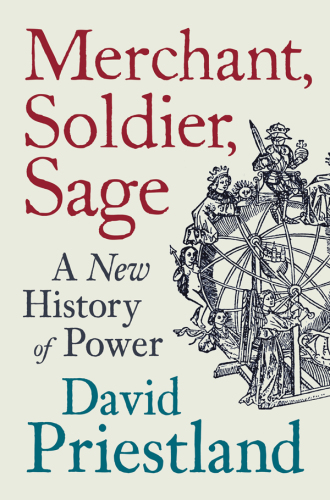
Merchant, Soldier, Sage
A History of the World in Three Castes
کتاب های مرتبط
- اطلاعات
- نقد و بررسی
- دیدگاه کاربران
نقد و بررسی

December 24, 2012
Distinguished Oxford historian Priestland (The Red Flag: Communism and the Making of the Modern World) offers a “big history” based on the power struggle between three different castes, each of which, he argues, embodies distinct “ideas and lifestyles, which they often seek to impose on others.” Citing figures and events from antiquity through to the present, he explores how tensions among the three groups repeatedly rise to a fever pitch, and eventually transform their host society, and sometimes the world—the most recent example of one of these “tectonic shifts” occurred with the financial crisis of 2008, when the exploits of the merchant short-circuited the global economy. Priestland predicts that in the future, the Great Recession will be classed among the great shakeups of the 20th century: WWI and II, the Great Depression, the fall of the Berlin Wall—each of which he touches on. In the course of his “broad sweep,” Priestland is consistently engaging, whether in his discussion of the marshaling of Confucius’s teachings for political ends, or in pegging former President George W. Bush as a warrior. The author’s project is necessarily exclusive—what, for example, of the laborer or scholar, or mother for that matter?—but it is also ambitious, well organized, and insightful, and will appeal to scholarly and popular audiences. Agent: Gill Coleridge, Rogers, Coleridge & White (U.K.).

December 15, 2012
The author of The Red Flag: A History of Communism (2009) returns to present the skeleton of a new theory of human history. Priestland (Modern History/Univ. of Oxford) employs the term caste to mean "self-interested bodies seeking economic advantage but also as embodiments of ideas and lifestyles, which they often seek to impose on others." He identifies three of them (see title) and says there is also a fourth (workers and peasants) which, he writes, we should not neglect. He notes that each caste has, historically, allied with the others to varying degrees (the merchant-soldier, for example), but each has sought to dominate discourse and politics. After explaining his terms, Priestland marches us through history, showing us how his model applies to and illuminates everything from the Reformation to Robinson Crusoe, Adam to Adam Smith, Andrew Carnegie to Ayn Rand, Hitler to Putin, and Richard Wagner to Sinclair Lewis (George Babbitt does not fare well here). He notes--no real surprise--that the world tends to get in trouble when it permits one caste to dominate. In recent times, he bewails the warrior ethos that impelled George W. Bush to invade Iraq after 9/11 and the "pervasive merchant value system" which drove the world to near economic collapse in 2008. Occasionally, Priestland sounds very much like Paul Krugman, especially when he declares that the stimulus package of 2008 was too small; he sounds like Elizabeth Warren when he slaps the faces of investment bankers, who, he writes, need firm reins. The author acknowledges that this is a theoretical, not a practical, text, but he does offer some vague solutions: more awareness of history and a balanced contribution of all the castes. Useful, often-clarifying trifocals through which to view the world.
COPYRIGHT(2012) Kirkus Reviews, ALL RIGHTS RESERVED.

February 1, 2013
We have, of course, seen this before. From Adam Smith to Karl Marx to even Francis Fukuyama, sages have attempted to explain the unfolding of history and the evolution of societies with overarching theories; then the theories turn to dust as individuals and societies define, act, and reinvent themselves according to their own lights. Priestland explains history as a recurring conflict between the castes of merchants, aristocratic warriors, and men (or women) of ideas, all of whom comprise a bureaucratic elite. Left out of the power struggle are the masses of workers. Unlike Marx, Priestland does not assert the historical inevitability of the triumph of one caste. But he warns that the recent domination of the merchants reached a critical and dangerous point with the financial crisis that wracked the West in 2008, and he maintains that failure to adjust by elites could lead to economic and political collapse. Priestland provides many interesting and provocative insights into the workings of these groups. Yet he often tries to force square pegs into round holes in order to validate his theory, which remains unproven and unconvincing.(Reprinted with permission of Booklist, copyright 2013, American Library Association.)

























دیدگاه کاربران